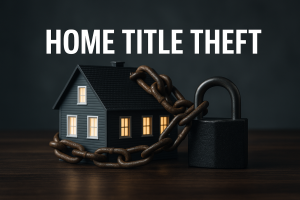Mortgage Loans
 It is sad that we are all culturally conditioned to get the biggest house that we can “afford.” And by “afford” we are talking about affording “the monthly payments” (not really being able to afford the house). If you take this too far and borrow too much you can end up being “house poor.” What that means is that your payments for your home are so significant to your own financial situation that you don’t have enough money left over for other needs and obligations. Just because someone will give you a loan doesn’t mean it works for you. It is critical that you look at the payment compared to your other monthly obligations to make sure it fits into your budget without creating an undue hardship on you.
It is sad that we are all culturally conditioned to get the biggest house that we can “afford.” And by “afford” we are talking about affording “the monthly payments” (not really being able to afford the house). If you take this too far and borrow too much you can end up being “house poor.” What that means is that your payments for your home are so significant to your own financial situation that you don’t have enough money left over for other needs and obligations. Just because someone will give you a loan doesn’t mean it works for you. It is critical that you look at the payment compared to your other monthly obligations to make sure it fits into your budget without creating an undue hardship on you.
If you can do a 15 year mortgage rather than a 30 year without creating an undue hardship you may want to consider it. Becoming mortgage debt free 15 years earlier can be a tremendous advantage to your financial future. Another option is to take the 30 year mortgage but make additional principal payments that gets you on a 15 year pace. If you are going to do this you need to be really disciplined or put it on an automatic payment, as it will be too tempting to skip some months when you would rather spend the money on something else. The one advantage of paying down a 30 year mortgage at a 15 year pace is that if a financial crisis ensues, you are only obligated for the 30 year payment (instead of being obligated to a much larger 15 year payment). In other words, you would have more financial headroom in case of a financial crisis.
I’m not a big fan of an interest only mortgage, as you are making no financial headway (you are just paying interest). Often people do this so they can “afford” a house that is out of reach financially with a traditional mortgage. I see this really as renting rather than owning since you are just making payments to live there but not making equity progress from a payment perspective. Some have done this in markets that are expected to have significant price appreciation, making a play to make a profit from the equity gain while paying as little as possible. This is somewhat of a risk (leverage cuts both ways).
I’m also not a big fan of a mortgage over 30 years. In my opinion, if you need to take out a mortgage that long in order to afford the payments, you are probably buying too much house.
Another cost of a mortgage loan that you want to avoid is PMI. PMI = Private mortgage insurance. This is generally required for anyone that puts down less than 20% of the purchase price of a home. This can add a significant amount to your monthly payment. This insurance is for the lender (in case you can’t make the payments) but you pay for it. The only way to get out of this is to put down at least 20% or request that it be dropped once your home value increases and your equity position gets you to 20%. Check with your lender to find out how this process works (what proof do they need). In many cases you will need to pay for an appraisal to prove that you have the 20% equity.
Related Article: Stop Paying PMI

Three things you can do this week to put money back in your pocket
Here are some quick hitters you can apply right now to put some money back in your pocket. It will require a little effort, but the hourly rate of return can be substantial. Let's get started! Number One - The Power of the Phone Call Pick up the phone and call a few...

Never buy a TIMESHARE!
I'll tell you why and then I'll give you my own experience and some ways to rid yourself of this expensive cash eating monster. First, anything sold using high pressure sales tactics is a bad deal. Timeshares are often sold by getting you to a resort by giving you a...

Don’t be Fooled by Fake Benefits that will Cost you!
Remember that businesses first want to survive and then to flourish, just like you. The difference is that businesses have armies of people whose goal is for you to buy their product or service. Through clever marketing many firms have managed to take something that...

Save Big with Second Opinions
I just read an article about a crooked dentist who took advantage of his patients by giving them unnecessary crowns and root canals. He gave some people more than 10 root canals over a number of years. Some never had any prior dental issues but were convinced that...

Do you need a Budget?
Do you need a budget? What is the purpose of a budget? Can you get by without one? Why have a budget The main reason for a budget is to decide in advance where your money is going to go. It is a way of being proactive with your money rather than reactive. One of the...

You can’t stop it but you can contain vehicle costs
For many people, cars are the number two cost each month only behind their home or rent expense. Not only that, but vehicles are a horrible use of money. They lose value rapidly, need repairs and maintenance, require insurance, registration and fuel costs too. A...

Should I Buy Individual Stocks?
Should I Buy Individual Stocks? It's a common question when deciding to invest in the equity markets. My opinion is that it depends on if you like to gamble and take risks with your money. My dad would always say "the stock market is essentially legalized gambling." I...

Age 30 – Time to Get Serious about your Finances
Once you hit age 30, it's about time to get serious about your finances. If you are like most (we've all been there), you enjoyed your 20's, spent money as needed, and essentially drifted through the years without a financial plan of attack. That's fine, but by around...

Benefits of a Health Savings Account
What is an HSA HSA stands for Health Savings Account. It is an account that you own and is designed for you to pay medical expenses now or in the future. If you meet the requirements by being in a qualified high deductible health plan (HDHP) you are then able to put...

Yes you Can Do Better than a 4% Safe Withdrawal Rate
It's well know in the personal investment community that a 4% Safe Withdrawal Rate (herein called "SWR") is the general standard for planning for retirement. It is based on a fantastic study by William Bengen in 1994 that proved that based on a classic equity / bond...

